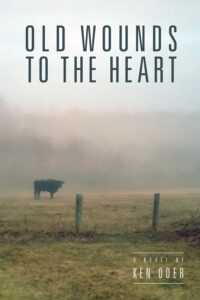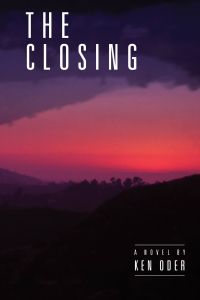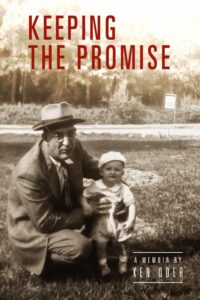The Abduction
Thanksgiving Day, 1967
Whippoorwill Hollow, Virginia
A red pickup truck crested a knoll on Whiskey Road two hours before dawn. Its driver cut off its lights and engine and the truck drifted down a hill, rolled across a one-lane bridge, and came to rest in a clearing beside the road. The door creaked open and a tall, stout man wearing a red ball cap, a hunting jacket, and bib overalls stepped off the running board into the pale glow of a silver-ringed moon. He blew a stream of vapor into the cold night air and leaned inside the truck cab. He withdrew leg irons and manacles and shoved them in the side pockets of his jacket, lifted a rifle from a rack over the back window, pulled its strap over his shoulder, and walked across the clearing to a split-rail fence. He unlatched a gate and closed it behind him.
A rust-red barn stood fifty yards in front of him. To his right, Little Bear River snaked through pastureland. A hill rose up steeply on his left and a two-story white farmhouse with a green tin roof stood on its summit. The house was dark and quiet and he saw no movement inside. He took off his hat, pulled a black ski mask over his head, and lifted the rifle off his shoulder to switch off the safety latch before he walked to the base of the hill.
In the house, Billy Kirby lay in bed thinking about the mess he had made of his life. He had passed his eightieth birthday in August. In September, his wife succumbed to cancer. They were estranged when she passed and she died hating him; his serial infidelity had broken her heart and wrecked their marriage. They had separated and reconciled many times, but even when they were together, they fought. Their only child was the worse for it all. He grew up to become a cruel drunk and an angry brawler. Billy had paid off Blakey’s victims and managed to keep him out of jail for most of his adult life, but in Blakey’s early forties he assaulted the boyfriend of a woman who had jilted him and held her at gunpoint in her bedroom for four hours. He was convicted of assault and kidnapping and was sentenced to ten years in the state penitentiary in Richmond. Billy blamed himself in part for the way Blakey turned out. Blakey blamed him for all of it.
Thanksgiving morning Billy was alone and miserable and saw no prospect of happiness in his future. He lay on his back in bed with his arm draped over his brow and stared at moon-shadows on the ceiling. Mary Jo’s death had pitched him into a deep well of grief and hopelessness. Since her passing he had become obsessed with the many mistakes he’d made that had ruined their lives: the trysts, the affairs, the scores of women who lined the long hallway of his memory. Most of them had meant nothing to him at the time beyond the pleasure and excitement of the moment, but for the past few weeks, his thoughts kept returning to a summer afternoon many years ago, before he married Mary Jo, when he lay on a blanket with a young beauty under a maple tree beside Little Bear River. She told him she loved him that day, and he turned away from her. In the winter of his life when it was too late to make a difference, he was convinced that rejecting her was his biggest mistake. He thought he could have lived a good life with her, but in his youth he was too foolish to understand that. He made the wrong choice and rejected her love. Now, in his old age, he was alone; no one loved him; and he loved no one.
Billy rolled over on his side and looked out the window at the barren limbs of a sweetgum tree swaying in the wind and thought about the pistol that lay in a bureau drawer fifteen paces from his bed. For three nights running, the specter of the revolver, its smooth blue barrel and its wooden grip, had haunted him. It offered the best way out, he thought. If his hand was steady, he would feel nothing. Death would be instantaneous, and the eight decades of mistakes that rode in the bottom of his heart like a sack of cold stones would die with him.
He was still thinking about the pistol when a scraping sound downstairs broke his concentration. The noise seemed to have come from the dining room window below his bedroom. He sat up in bed and listened. The dining room floor creaked near the window and then groaned farther into the room.
He got out of bed, crossed the bedroom, and withdrew the pistol from the bureau drawer. He stood looking down at it, cold and heavy in his hand, his thoughts of ending his misery still fresh in his mind. The faint popping and cracking of the staircase drew his attention back to the problem at hand. He took a step toward the hallway and listened. He could barely hear the light tread of someone creeping down the hall. He tiptoed to the bedroom closet, stepped inside, and peeked through the crack between the door and the frame. A man wearing a black ski mask and carrying a rifle stepped into the moonlit room and went to the foot of the bed.
Billy stepped out of the closet and trained his pistol on the man’s back. “Drop it.”
The man turned and faced Billy.
“Drop the rifle,” Billy said, “or I’ll shoot you down in your tracks.” The man hesitated and then took a step toward Billy. Billy squeezed the trigger. There was a click, but no explosion. The man in the ski mask flinched. Billy squeezed the trigger again, but there was no report. Again. Still nothing. The man closed the distance between them and brought the barrel of his rifle down on Billy’s head.
Billy lay on a blanket under a maple tree by Little Bear River. A young woman lay beside him, sleeping. A soft wind rustled the leaves and leopard spots of shade and sunlight quivered on her smooth skin. He traced his fingertips from the curve of her hip up her back to her shoulders and caressed the silky blonde curl at the nape of her neck.
She stirred and rolled over, covering her breasts with her arm. A lock of golden hair fell across her eyes, and she smiled. “I love you, Billy.”
His gut tightened, but he forced a smile. “Come on now, darlin. Don’t spoil the fun with that foolishness. You don’t love me. You love the good times we’ve had. That’s what you love, the good times.”
The hurt took a while to gather in her eyes, but it soon came on strong. She rolled over and pressed her face into the folds of the blanket and her shoulders shuddered with quiet sobs.
When he reached out to touch her, the blanket beneath them began to move and he fell backwards, confused. Night had fallen suddenly and she was gone and he was on his back. He raised a hand to his throbbing head and his other hand dragged strangely along beside it. He held his hands up to the moonlight. They were handcuffed together and there was blood on them.
He groaned and looked around. He was sliding across frozen ground on his back. His ankles were bound by leg irons and a ski-masked man with a rifle strapped over his shoulder was pulling him across the yard by the chains of his leg manacles. He pulled Billy through a break in the boxwood bushes that lined the driveway and Billy’s nightshirt rode up his back and gravel raked his flesh. The man stopped, leaned over, and propped his hands on his knees, breathing heavily. Billy wanted to get to his feet to try to overwhelm him, but the blow to his head had robbed him of his strength and his will.
Billy’s assailant seemed to recover his wind. He picked up the leg irons and pulled Billy on across the yard to a split-rail fence. He grabbed Billy’s handcuffs and pulled him up to a standing position. Then he shoved Billy against the fence, forced him to bend over the top rail, and pushed him over it. Billy slid down to the ground on the other side and lay helplessly on his back while the man climbed over the fence. His trailing leg hung on the top rail and he almost fell, but he righted himself as he pitched forward and he landed on his feet. He bent over and grasped his knee, groaning. After a short while, he straightened up, grabbed the leg irons, and dragged Billy down the hill toward the barn.
Grit and rocks sliced Billy’s back and he wanted to scream, but he could not; a farmer had crushed the life out of his voice during a fight in a saloon in 1938. After that brawl, Billy’s voice sounded like a file dragging across a piece of iron. Thirty years later, his cries were rasping hisses that didn’t carry across the cold night air.
The man stopped at the bottom of the hill and propped his hands on his knees again to catch his wind. Billy tried again to muster the strength to resist his attacker. He rolled over and slowly got up on his hands and knees, but the man kicked him in the side and he fell over on his back. The man grabbed the leg irons and dragged Billy through the gate to the rear of a pickup truck parked in a clearing by Whiskey Road. He leaned against the truck, gasped for breath for a few seconds, and then lowered the tailgate and pulled Billy up to a standing position. He motioned with his rifle for Billy to climb up on the truck, and Billy crawled into the truck bed on his hands and knees. His assailant climbed up to stand beside him, put his boot on Billy’s back, and pushed him down to lie flat on his belly.
Billy rolled over on his side. “Who are you?” he said. “Why have you attacked me?”
The man cried out, a guttural sound like the cry of an animal caught in a trap, and kicked Billy in the gut. Billy curled into the fetal position and retched. His attacker stood over him, pointing the rifle at him. Billy stared at the mouth of the barrel, his heart pounding. After a few seconds, the man stepped back and cursed under his breath. He leaned over the side of the truck bed, set the butt of the rifle on the ground, and propped it against the truck.
He forced Billy to roll over on his back, looped a chain through the handcuffs, and attached it to an anchor on the cab. He slid a chain through the leg irons and hooked it to the tailgate so that Billy was stretched out on his back. The man picked up a rolled-up tarp that lay in the truck bed, unfurled it, and spread it over Billy. It was coarse and rough against Billy’s face and carried the scent of gasoline.
Billy could see nothing with the tarp covering his face, but he felt the truck bed rise slightly and heard the crunch of gravel at the rear of the truck, followed by the creak and clank of the tailgate being lifted and shut. He heard steps moving to each corner of the truck bed, followed by a rustling of the tarp, and he guessed that the man was tying it down. Billy heard the door slam and the engine start and felt the truck move forward. From the shifting of his weight, he thought the truck turned right out of the clearing and climbed the hill to Kirby’s General Store, Billy’s store. It felt as though it stopped there at the intersection of Whiskey Road and the state road, turned left, and sped up.
Wind surged under the tarp and whipped at Billy’s face and he shivered and took his breath in short bursts. Ten minutes into the ride, a corner of the tarp broke free from its tie-down and blew across his chest and he saw steep mountains rising up on both sides of the road and leafless branches arching over the truck like bony fingers clawing at the purple night sky. Much later, he heard the roar of water falling from a great height. A cold mist kissed his brow just before he passed out.
When Billy regained consciousness, dawn had broken. The air was still and cold. The aroma of gasoline was strong, but the truck was parked and the engine wasn’t idling. The tarp was gone, but he was still chained on his back in the truck bed. The early morning sun cast shafts of light through trees on a hill to his right, and there was a chorus of birdsong.
Billy knew where the man had taken him. He had felt the truck turn left at the T where Whiskey Road met the state road at Billy’s store in Fox Run to head north into Whippoorwill Hollow. Twenty-two miles from the farm town of Fox Run, the state road passed Whippoorwill Hollow Dam and ended at an entrance to Shenandoah National Park, and from there a network of dirt roads maintained by the park for firefighting cut through mountainous wilderness.
Footsteps rustled through a slush of leaves and the ski mask loomed over Billy. The man’s dark eyes glistened through the eyeholes.
“I know where we are,” Billy said. “I felt the spray off Whippoorwill Hollow Dam last night. We’re in the park. Why did you bring me here?”
The man unlocked the chain anchoring Billy’s handcuffs to the cab and moved to the rear of the truck. Billy sat up on his haunches. “Who are you?”
The man dropped the tailgate and dragged Billy out of the truck. He threw him to the ground and kicked him in the ribs, and Billy curled up and gagged. The man went to the cab and returned with his rifle. He motioned with it for Billy to stand, and Billy struggled to his feet. He grabbed Billy by the shoulder and turned him to face a steep hill, poking him in the back with the rifle. Billy staggered forward, but the restraint of the leg irons made him stumble. He stopped to regain his balance; the man prodded him in the back again; and Billy hobbled forward slowly. His bare feet were tender and his ankles were sore from abrasions inflicted by the irons. Each step was torturous, but the man gave Billy no mercy. He punched Billy with the rifle whenever he hesitated, and each blow was more painful than the last.
The climb was steep and arduous. Near the top of the hill, exhaustion overcame Billy and he fell to his knees, gasping for air. The man poked him in the back with the rifle and Billy fell forward on his face. “I can’t go on,” he said.
The man put the barrel to the back of Billy’s head. Billy squeezed his eyes shut, fear choking him. The man held the gun to his head for a few seconds and then pulled it away. Billy rolled over on his back and looked up at the man, who was standing over him and glaring at him, trembling. The man motioned for Billy to stand.
“I can’t,” Billy said. “I’m spent.”
The man cursed, bent down, and grabbed the leg irons. He twisted Billy around and dragged him up the hill, stopping once to catch his breath before he pulled Billy the last few feet to the summit. He dropped the leg irons and leaned against a big oak tree, gasping for air.
Billy rolled over and slowly got up on his hands and knees. His head hung down between his shoulder blades and spittle ran from his mouth to pool on the carpet of leaves beneath him. After a while, he lifted his head and looked around. A deep ravine lay at the bottom of a cliff about twenty feet to his left. He could see the face of the opposite mountainside and a good ways down the hill they had just climbed. There was nothing but wilderness as far as he could see.
The man kicked Billy in the side again and Billy fell and rolled over on his back, clutching his side and gagging. The man picked up a long chain that was coiled at the base of the oak tree and dragged it to Billy. He grabbed Billy’s hands and stretched them over his head, looped one end of the chain through Billy’s handcuffs, and padlocked the end links together to bind it tight to Billy’s cuffs. Then he carried its other end to the oak tree, slipped the chain through a steel ring attached to the end of a metal stake that protruded from its trunk, and padlocked the chain to the ring.
Billy rolled over and got up on his hands and knees. He looked up at the man. “Do you aim to kill me?”
“I do.” The man’s voice was choked with anger.
“Why?”
The man turned without a word, trudged down the hill, and disappeared in the growth below.
Billy crawled to the oak tree and sat leaning against it. He felt the wound to his head. It was swollen. A crusted scab under his hair was sore to the touch and his ribs ached from the man’s kicks. Billy pressed his hand against his side and winced.
A cold wind blew across the top of the hill. He pulled the collar of his nightshirt tightly around his neck and looked up at the stake he was chained to. He grabbed the stake and pulled himself up to stand beside the tree with his legs quivering. He tried to pull the stake out of the tree trunk, but it was pounded deep into the oak.
He slumped to the ground and rubbed his shins and his bare feet to warm them. The sky darkened and the wind blew. Tree branches clattered together like brittle bones. A hawk floated just under the cloud cover, searching for prey. It tilted its wings and banked down behind the opposite mountain.
Billy thought about his assailant. The truck’s presence inside the park meant he had a key to the gate. To have a key, he had to be someone who worked for the park, a ranger or a fireman, or someone who owned property on its far side. He had to be someone who knew Billy couldn’t cry out, because he hadn’t bothered to gag him. He was familiar with Billy’s house because he’d come straight to the bedroom. Billy knew the man’s stiff legs and shortness of breath all too well as the infirmities of old age. The man had to be old, perhaps as old as Billy. Billy reviewed his acquaintances searching for a match, but he could think of no one who would attack him so violently.
The wind blew harder and the cloud canopy descended upon the summit of the hill like a slate ceiling. Billy gathered his nightshirt more tightly around him and thought about the man’s stated desire to kill him. He should embrace the man’s homicidal intention, he told himself. His misery was so deep that he had considered death by his own hand. Why not give in to this man’s murderous rage?
A gust of wind blew Billy’s hair across his face. He brushed it back and stared into the gray miasma, pondering his own death. After a few moments, he stirred from his thoughts, put his hand inside his nightshirt, flattened it over his chest, and felt his heart beat, steady, strong, persistent.















